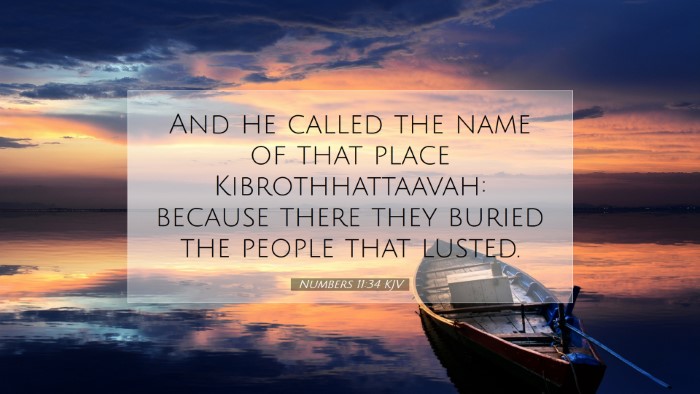Commentary on Numbers 11:34
Numbers 11:34 states: "And he called the name of that place Kibroth Hattaavah: because there they buried the people that lusted." This verse serves as a critical juncture in the Israelites' wilderness journey, encapsulating significant themes of desire, consequence, and divine judgment. Here, we explore various insights drawn from public domain commentaries to provide depth and clarity to this verse.
Contextual Overview
To fully grasp the implications of Numbers 11:34, one must consider the surrounding narrative. The Israelites, after being led out of Egypt, find themselves grumbling over their provisions in the wilderness. Recent events had shown God's miraculous ability to provide, yet dissatisfaction and longing for the "flesh pots" of Egypt filled the hearts of the people.
The Name Kibroth Hattaavah
The Hebrew phrase Kibroth Hattaavah translates to "the graves of lust." It illustrates a grave consequence for the people's intense craving. The use of the term "graves" denotes not just physical death but signifies spiritual and communal demise due to their lustful desires.
- Matthew Henry comments that this naming signifies both memorialization and admonition, highlighting the serious nature of their desires that led to death.
- Albert Barnes notes that this place serves as a reminder of what happens when cravings are unchecked and the consequences of turning away from trust in God's provision.
- Adam Clarke emphasizes that such naming ought to evoke a sense of warning for future generations about the perils of unrestrained desire.
The Theme of Lust and Desire
The lamentation over the food supplies raises the underlying issue of covetousness, which is a recurring theme throughout the Bible. This particular episode serves to caution against:
- The dangers of nostalgia for past comforts that can lead to rebellion against God's current provisions.
- The inability to appreciate the present blessings due to discontentment.
- The swift transition from desire to idolatry, placing cravings above God's will.
Divine Judgment
Numbers 11:34 also highlights the consequences of enticing desires. God, responding to the Israelites' insatiable appetites, sends quail, but with it comes a plague. This duality of provision and judgment illustrates the principle that:
- Matthew Henry implies that while God's provision is abundant, his patience can wear thin in the face of persistent rebellion.
- Albert Barnes elucidates that divine gifts may sometimes be accompanied by sorrow, teaching that unchecked desires can yield disastrous results.
- Adam Clarke warns that such acts of divine judgment should be viewed as divine discipline, aimed at repentance rather than mere punishment.
Theological Insights
This passage invites deeper theological reflection, including:
- The Nature of God - God is both a provider and a judge. His provision is not a blanket assurance of unqualified blessing; instead, it calls the faithful to righteousness and contentment.
- The Human Condition - The recurring human struggle with desire points to a need for continual dependence upon God's grace, affecting not only physical needs but spiritual condition.
- The Call to Remember - The ultimate memory serves as a teaching tool for believers: to reflect on the past warnings of discontentment and their consequences to safeguard against repetition.
Conclusion
Numbers 11:34 encapsulates a sobering reminder of the consequences of unchecked desire through the lens of Israel's experience in the wilderness. It serves not only as a historical lesson but also as a spiritual caution against the lusts that can entrap believers today. Through the insights of Matthew Henry, Albert Barnes, and Adam Clarke, we gain a comprehensive understanding of the multifaceted lessons that this passage imparts.
As we reflect on Kibroth Hattaavah, may we be diligent in our desires, intentionally seeking God’s provision with gratitude and faith, allowing His grace to guide our cravings and, consequently, our hearts.


